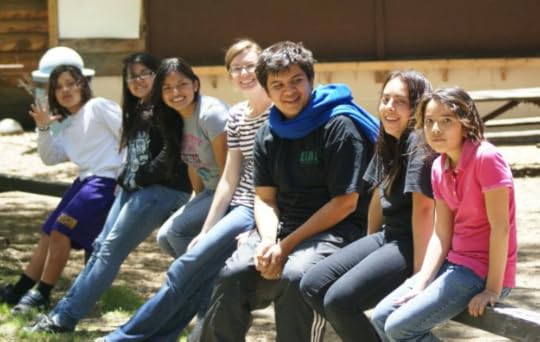Jonalyn Fincher's Blog, page 18
April 10, 2013
Why You Need to Understand Food Allergies
Part 2 to Part 1: Fully Disabled: Fully Human
Dr. Ellen moved toward me for a hug of greeting.
“You’re wearing that perfume that gives me a headache,” she said.
“I’m sorry,” I mumbled, but I didn’t get how an expensive fragrance could bother her enough to embarrass me about it.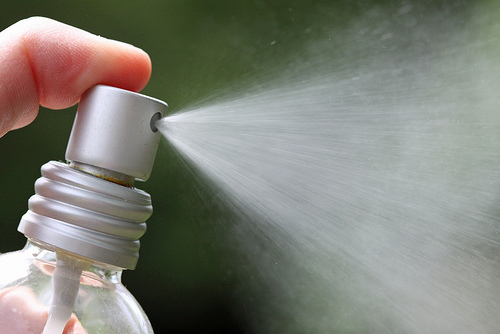
Over fifteen years later, I would learn about fragrance sensitivity, but at that time I wasn’t ready to listen.
Last fall, I finished a five-year ordeal of determining my husband’s stomach issues. After nights of suffering, watching him endure in the fetal position in hotels across the United States, finding the foods that triggered relief for me (mint, ginger, chicken soup, tomato soup, saltines, pasta with a butter or tomato sauce) did nothing for him or made him worse, we finally found a solution.
First, he needed his gallbladder removed.
Second, after taking an in-depth blood test (MRT), he discovered an acute food sensitivity to chicken, tomato, ginger, mint, oregano, gluten, chocolate, and quite a few more.
Not until I watched the man I love slowly lose his appetite for food, his freedom to eat out, his joy in travel did I develop the appropriate sensitivity to food.
And along the way I met Kim Middleton, RubySlippers commentor, wife and home schooling mother to two elementary aged children.
I used to think food allergies were rare or maybe exaggerated, but Kim taught me differently. One in thirteen children have a food allergy (Check out this infographic to get informed).
In my interview with Kim, who works as a Team Anaphylaxis Parent Advocate and leader of the Inland Empire Food Allergy Support Coalition, she explained why so many parents feel isolated when their children suffer from a food allergy.
In 2002, my daughter was literally born allergic to cow’s milk protein. If she ingests even a microscopic trace she will stop breathing within minutes. She is also contact allergic meaning she will develop hives if it touches her skin and then we must watch closely for an anaphylactic (life threatening) reaction. She also reacts to inhaling airborne milk protein such as walking through a restaurant or Starbucks where milk is being heated and is aerosolized. There are many places we simply must avoid. She must carry Epi Pens (Injectible Epinephrine) wherever she goes, even if just out for a walk.
Anaphylaxis is a condition that effects the whole family. Our home has been dairy free for many years out of necessity. Our entire family including her five-year-old brother must be vigilant 24/7 not to expose her. Adult caregivers must be trained on how to administer epinephrine. All outings and vacations must be planned in advance and within close proximity to a hospital. We pack food with us every single place we go.
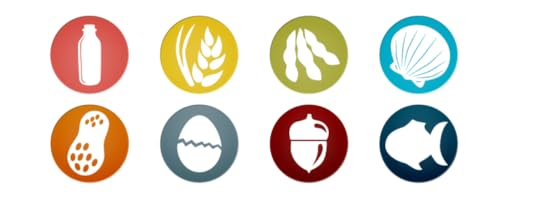
In this world, attitudes about food have the power to unify or divide. Studies have shown that food allergic children have lower quality of life that those living with diabetes. It is a constant balance between normalcy and safety. We have lost many friends and family members who choose food and convenience over my daughter’s safety and spending time with us. Many people simply do not believe food allergies are real or serious.
What has your daughter taught you about food, people, culture?
People project all sorts of emotions, meanings and even experiences onto food and the necessity for it to be available at all times. We are a generation of parents raised on Capri Sun and prepackaged on-the-go snacks who no longer observe social graces such as sitting down to eat, or washing hands afterwards. It is easy to see how how our country has become obese when food is either expected or offered at every occasion. Food allergies put a magnifying glass on who people really are and how important you are to others.
Tell us a little bit about your work in advocacy for parents of children with food allergies
In 1990, life threatening food allergies were considered a disability by the ADA because it effects the major life functions of eating and breathing. As such, children with food allergies must be evaluated by public schools for 504 plans which offer accommodations to level the playing field so that food allergic students can access all aspects of the school day the same as their non-disabled peers. My daughter’s school violated her 504 plan and behaved so shockingly that we were forced to homeschool for her safety. We filed a complaint with the Office For Civil Rights and won our case. I have learned so much over the last several years of doing legal research. Our support group which consists of other food allergy parent advocates. We are openly Christian mothers working for free as a ministry. Our hope is that by teaching and coaching other parents to be effective advocates we will build a nationwide army that is equipped to defend itself against the public school system. In addition to giving parents information we pray for them and their life situations.
I have a simple daily prayer. “Please help me to help someone today.” As an advocate I have the humbling honor of discipling parents of children with special needs. I have two main goals, to encourage and to empower. However, it is the determination and tenacity of these parents that propel our movement for more education and enforcement of civil rights forward. I am rewarded by children gaining confidence because they are safe and living less fearfully, children who experience daily inclusion rather than exclusion at school, children who are able to attend their first school dance, able to participate in Girl Scouts, who don’t take risks to fit in, and who are confident in their ability to self advocate because they believe they are of equal value. These brave and compassionate children will someday lead us.
What can we do to help those with food allergies enjoy community with us more easily.
 Families with food allergies want to be included. Food focused events often exclude our participation because the environment is unsafe for us or our children. We greatly appreciate those who make us feel safe and welcome by supporting our needs. It’s not a joke (see here for an example of what we battle).
Families with food allergies want to be included. Food focused events often exclude our participation because the environment is unsafe for us or our children. We greatly appreciate those who make us feel safe and welcome by supporting our needs. It’s not a joke (see here for an example of what we battle).
If a family makes a request of you, it is because it truly takes a village to raise a food allergic child. One of the best ways to help allergic families is to eat in designated eating areas and to wash your hands afterward. That smudge of peanut butter or powdered cheese left behind on play equipment is capable of triggering a fatal reaction if accidentally ingested by a food allergic child.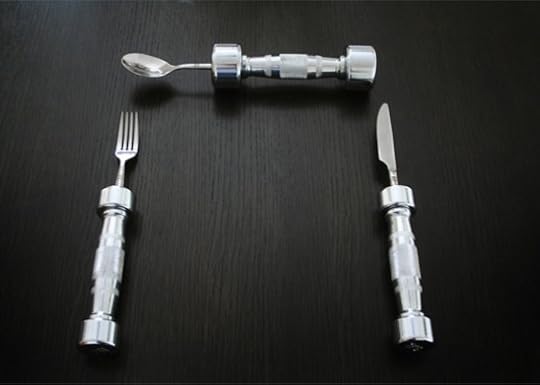
If food allergies have a tendency to magnify flaws, they also create an opportunity for God to use others to stand in the gap to I am always amazed when people I barely know generously donate money for an allergy walk, demonstrate public support, seek ways to include us, and genuinely show care and concern.
What are some resources you can recommend:
Caring for Your Child with Severe Food Allergies by Lisa Cipriano Collins deals with the emotional aspects of this chronic condition.
FARE (Food Allergy Research and Education) foodallergy.org can direct those seeking support to local groups.
There are also many wonderful groups on Facebook with varying levels of privacy.
For families with school aged children attending a federally funded institution, I highly suggest obtaining a 504 accommodation plan for your child. Life threatening food allergy is considered a disability under the ADAAA and Section 504 of the Rehabilitation Act offers legal protections against discrimination and guarantees equal access to the educational environment.
Food allergy support group. You will need help with so many things: what manufactured foods are safe for certain allergies, how to read a food label, how to substitute food ingredients, what medications, allegens, soaps, lotions, sunscreens, cosmetics are allergen free, how to’s (eat at a restaurant, vacation, deal with a disbelieving spouse who keeps feeding allergens to a child, mother-in-laws who think you are putting your child in a bubble, send a child to school safely etc)…the list of questions is endless. Food allergy parents are constantly fatigued from the stress of food shopping, preparing safe foods, advocating on behalf of their child everywhere they go, supervising play dates, being room mom, attending all field trips, Dr. appointments, managing jobs, homes, and nurturing children who are often excluded or suffer anxiety, all the while being criticized as a neurotic parent. Support groups offer empathy and community.
To support Kim, join or share her support group, share this post or friend Kim on facebook. Kim will be joining us in the comments, so feel free to pepper her with questions.
April 3, 2013
Irrigating Deserts – what Soulation Gatherings look like
The task of education is not to cut down jungles, but to irrigate deserts.”
– C.S. Lewis, quoted by Beth
The week is months in the making. Dale and I read through each application and consider who will share for 20 minutes. We contact the presenters and give feedback. We create our own presentations. We plan the schedule and dream up new ideas. We make sure a babysitter can care for our son for the intensive five days.
We coordinate the caterer and find the house that will comfortably sleep eleven. We pray and wait.
The Wednesday afternoon when they arrive, my stomach is a knot. Even though the food will be amazing this week I won’t be able to eat much.
On our first hike we will watch each other maneuver the hills and rocks, thrown together with these eleven strangers we will wonder if this Gathering idea was sort of crazy.
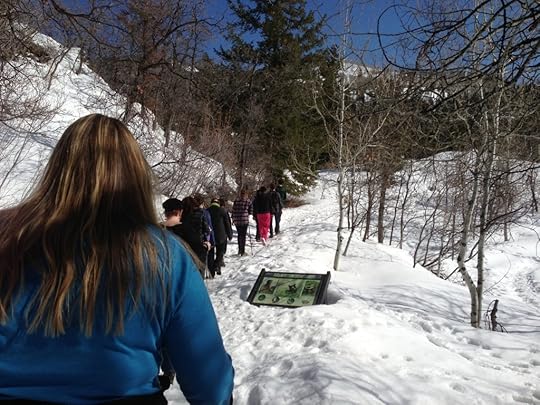
WHITE Gathering Snowshoe, March 27, 2013
We introduce ourselves over dinner and begin to unsheath the layers of protection we brought with us. We start revealing who we are, not who we want to be.
We listen as Dale talks about this Gathering’s theme, “Love’s Many Faces.” Jonalyn lights candles, one for each of the loves and we sit and savor a cheese plate with names we’ve never imagined.
As the white stilton with mango and ginger melts on our tongues we melt a bit ourselves. We toast this beginning.
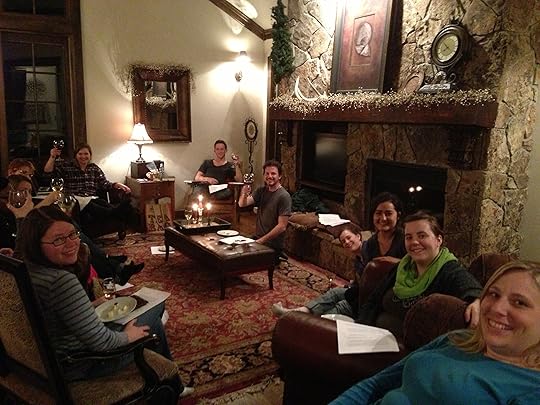
Wednesday eve, WHITE Gathering, 2013
We lay on our pillows in a house we’ve not known, with people we’re just learning to know and we awake with wonder and curiosity.
The days begin to slip, like sugar through our fingers. Beth presents on the longing of unmet desires and we all find we’re living with hungers we don’t realize. We watch a movie together and cry about the longing for a community we have not found, a love we haven’t tasted. We snowshoe the White Woods and glissade down hills giggling when we fall.
We listen to a single mother present the beauty and brokenness in owning a female body. We allow her to unhinge our sexual shame and follow her lead in bringing our secrets to the light.
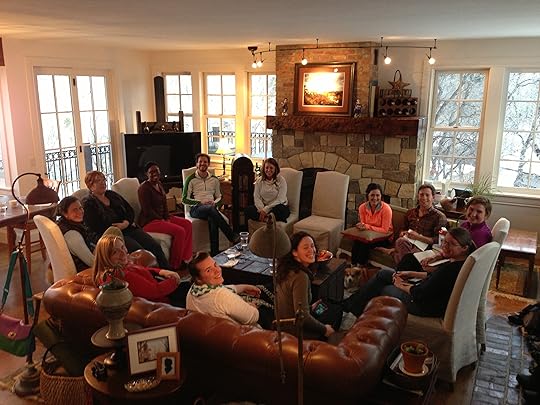
WHITE Gathering in White Woods, Thursday eve
We step into the darkness and cold to watch Orion shoot his bow into the heavens and let the wonder of Pleiades’ sapphires pierce our souls. We watch Saturn move outside the telescope view and walk back briskly for hot chocolate.
We listen to music and dance, we wonder over the talent among us, the poets and songwriters, the preachers and priests, the storytellers and essayists, the hidden depths in our own souls, the beauties in our own bodies.
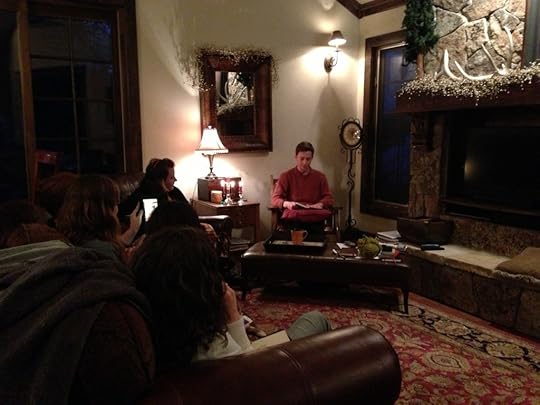
Drama, Open Mic, Saturday night, WHITE Gathering 2013
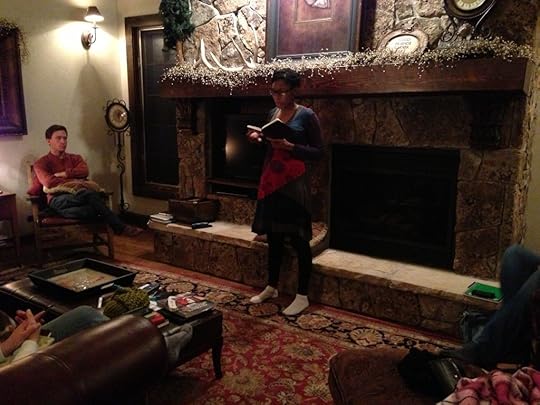
Slam Poetry, Open Mic, Saturday night, WHITE Gathering 2013
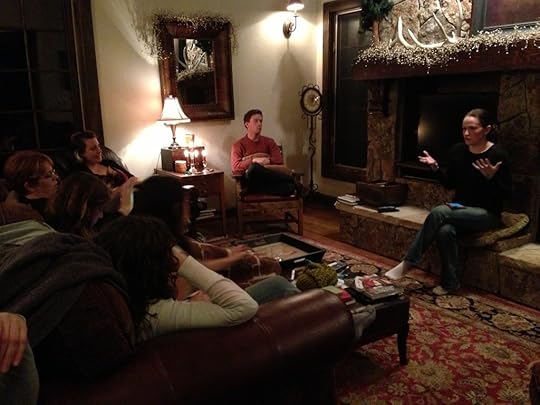
“On My Own”, Open Mic, Saturday night, WHITE Gathering 2013
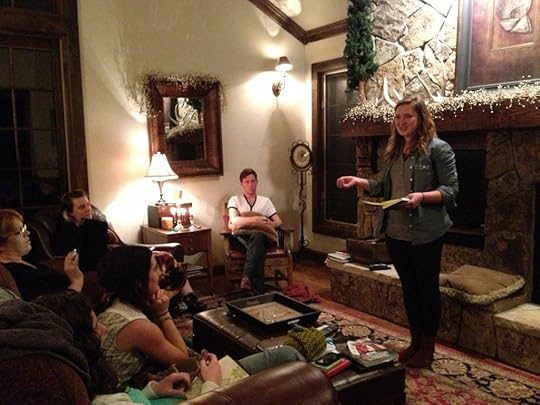
Poetry, Open Mic, Saturday night, WHITE Gathering 2013
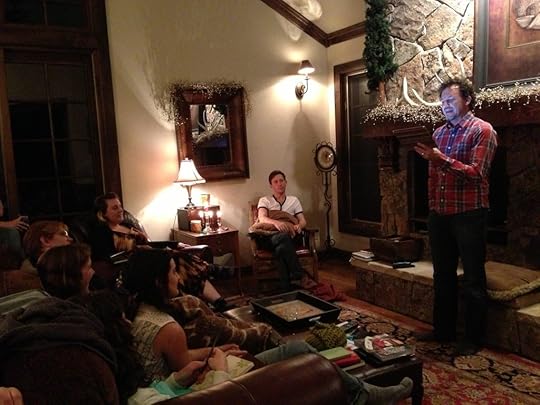
Victoria Secret poem, Open Mic, Saturday night, WHITE Gathering 2013
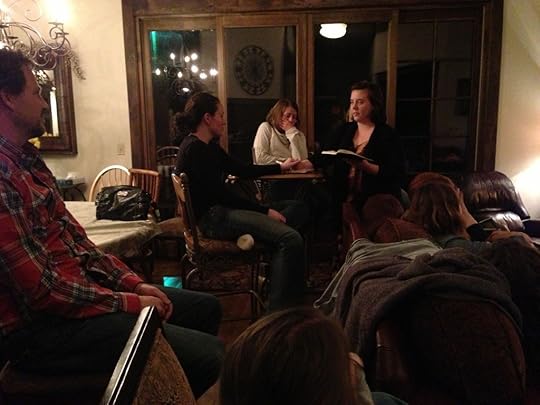
Blessings, Open Mic, Saturday night, WHITE Gathering 2013
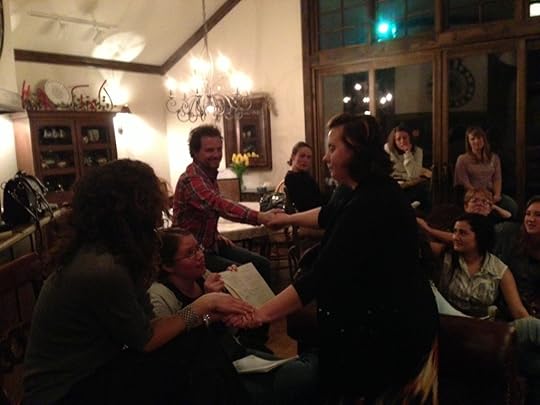
More blessings, Open Mic, Saturday night, WHITE Gathering 2013
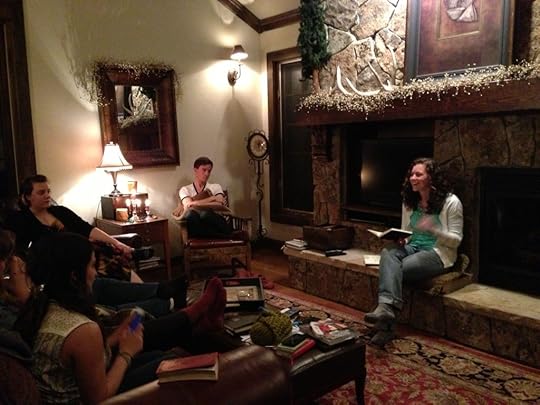
Poetry, Open Mic, Saturday night, WHITE Gathering 2013
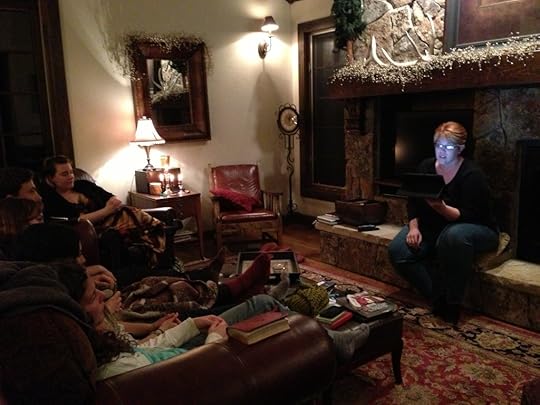
Storytime, Open Mic, Saturday night, WHITE Gathering 2013
We sign each other’s journals like yearbooks, we explain how each face this week has shown us Love’s many faces. We cannot believe it is Sunday and our planes and cars await us. We leave knowing something new has been forged.
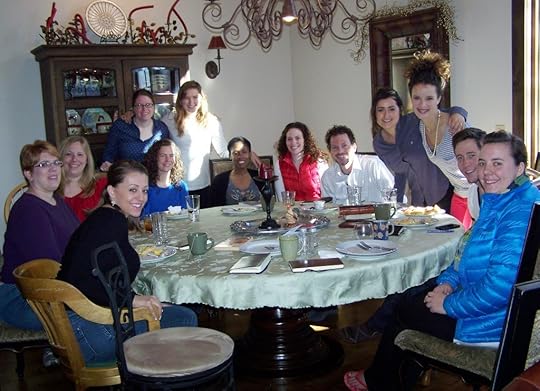
Easter morning, WHITE Gathering, 2013.
In their words . . .
“This is the community I longed for, you have shown me it is real.”
– Atticus
“We are like a nebula, all of our dust compressing, being ignited, heated and compressing our souls. I’m not sure when each of us will reach fusion but the universe is about to welcome eleven more starts. You make us brighter.”
– Stephanie
“You have created the space for glorious things.”
– Katelyn
“You have let me accept love and I don’t do that easily.”
– Esther Joy
“Each of your lives is a part of my life.”
– Shannon
“Every person has accepted every person.”
– Grace
“This is God’s kingdom coming.”
– Amy
This summer, GREEN (which still has a few open spots) will bring ten new souls to Steamboat. This Fall, GOLD will bring more strangers to become friends (theme: “What is the Church?”). I invite you to come.
March 27, 2013
What our Bodies Know
How often have we looked at our bodies and found something we’re not quite familiar with? It happened in junior high, it happens through high school and then our first sexual experience. Wait, you mean my body can do THAT.
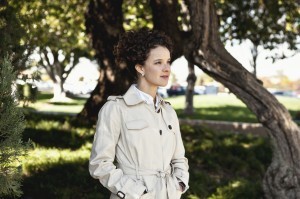
Pretty darn cool. But the amazing prowess of a man or woman’s body in bed is just a slice of the pie. Women witness distinct peaks and dips in the shape of our bodies that can feel like a foreign invasion (Wait, I didn’t want that, aren’t I too old for that?): breasts, fertility, pregnancy, lactation, menopause.
We have a few more cycles than men. But yes, guys can relate. Male or female, our bodies surprise us.
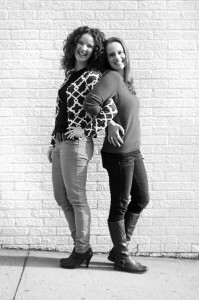
Photo op with my co-writer and dear friend, Dr. Sally Falwell. Photo credit: Bethany Saunders.
What with woman’s rise and fall of our abdomens, our breasts, what with a man’s rise and fall of his sexual organs, the breadth of his chest and shoulder, the thickness of his abdomen, the work of gravity, the work of stress and age and, for women, menopause, we will all have to reacquaint ourselves with the body we have again and again.Our bodies are part of the knowledge of ourselves. They teach us what we hunger for when our reason, our will, our beliefs want something else.
As we watch our bodies weather storms of euphoria and crisis, we have these scars, a map of where we’ve been.
While I’m still learning to appreciate the new tummy my son bequeathed me, to see the rise in my abdomen as a signpost that this spot held life (Life in Momma’s Belly),to feel less grateful but less covetous about flat bellies (Flat – Pre and Post Pregnancy Body), I’m also finding this body work is not a good place to be alone.
I hunt for friends who are comfortable and beautiful in their own skin. I want friends for the voyage of living gracefully as a woman in my body, not hers or hers or hers. And certainly not the pre-pregnancy body I once owned.
If we share our struggles, we will find we are not alone on the seas.
Confessions of a Softening Body
by Amy Kaneko
[image error]
Amy Kaneko with her third child
We sat for tea time
On the living room floor,
The woman and I.
Eyes pointing at a book,
She asked if I would show her my photo album;
It was the one alive
With post pregnancy pictures,
Back to when my hair was a blushing sky
Scraped back into a fresh
Mommy pony tail,
Back to when I began canoeing for miles
Into a deep blue ocean
So I could lose the newly found baby weight.
I brought the crack-spined book to her lap.
Pages opened,
Words unsheathed,
And,
“Oh Amy,
you
were
so
fat”
She said.
A word-scalpel drew out
And before I could stop the surgery,
It cut my stomach flat.
I watched flesh and belly sputter stains on a white rug.
Words can do that; they’re surgical tools.
That day, I learned the “F” word has 3 letters
And an unsterilized edge.
[image error]
Amy performing at Hawai’i Town Poetry Slam
Later that afternoon the woman left
But she forgot to take
The notched scalpel with her;
It was still stuck jagged in my stomach.
So I climbed into the attic closet,
Wrenched it out and hid it
In the fleshy photo album
I sobbed my rivers dry
Until that album drowned shut for years.
Now there’s a water-logged photo book
And a rusted scalpel
Buried somewhere beneath the Pacific.
When my mom had a plastic surgeon
Slice across her abdomen
She told me she just wanted her old body back,
The one she strutted hard and sleek when she was 20,
The one she had before my 2 siblings and I
Made a home of her.
So the doctor slashed down the soft wall
Which held all the #2 pencil marks of our
First baby heights.
Now mom wears a bikini again.
Thrice over,
I’ve inflated, deflated,
Inflated, deflated,
Inflated, deflated.
And I soften a little more every time this happens.
When I swelled pregnant this third time,
I told myself I’ll let this baby grow me
Flushed blushed happy,
And after the final push
I’ll continue to show kindness
To this softening-home body.
I fight for this kindness everyday.
~~~
Are you searching for this kindness? Who has helped you? Who has hindered you? Tell us more about how you’re learning the story of your body.
Please comment below.
March 20, 2013
Poets Will Save the Church
Last week, my dear friend A., flew from Hilo, Hawai’i to visit me in Steamboat. We snowshoed, cooked, read and wrote poems, danced with the pattern of time alone and time together.

Our little poetry night, listening to A. read.
And then she left.
The last night of her stay, I hosted a “Little Poetry Night” with my friends in Steamboat. We shared poems we loved from Emily Dickinson’s “She Sweeps With Many-Colored Brooms” to Jane Kenyon’s “The Shirt“.
A. shared her Spoken Word poems as well. And as she’s won Hawai’iSlam competition more than a few times, we were filled to brim. Here’s one of my favorites, “Colorado Says Its Ready” written before her trip.
A’s visit combined with my husband’s work on spiritual abuse brought together a significant problem and solution. I am indebted to both of them for this connection.
One, the problem of spiritual abuse.
Two, the living solution of poetry.
Like emotional or physical abuse, spiritual abuse, can harm the body and the soul. But fists and words are not the only tools. Spiritual abuse distinguishes itself by using God’s name to do the damage. As Dale writes, it’s the ultimate “taking God’s name in vain.”

Preaching at Steamboat Christian Center
The problem is rampant, particularly in formal church gatherings, where often a man need only step behind a pulpit to be taken as God’s messenger. Having preached my first sermon last week I don’t wonder at the temptation: the power is intoxicating.
Spiritual abuse is threatening to take the potency of our local bodies and fold it back on itself. While souls wither, Christians fight internally, sharpening our sticks against our own. Nothing castrates the potency of the body of Christ like spiritual abuse. Spiritual abusers use God and his moral code to whip humans into shape. Spiritual abuse turns the Good Shepherd into the Great Accuser, swapping God’s words with the Enemy’s.
At core, spiritual abuse makes us less human and less like Jesus.
Spiritual abuse has a few roots (e.g. Trapped Within the Bible) that Dale is carefully unearthing at Soulation’s FreeAtLast.me each week.
But, one major tool against spiritual abuse (both abusers or abused) is easily overlooked.
Where have all the poets gone?
As Kathleen Norris writes, “No parent really wants his or her child to grow up and become a poet” (The Quotidian Mysteries, 28). When was the last time you saw the writers, the poets, the musicians gathered to the front of the church to enjoy the blessing of the elders laying on of hands and commissioning prayer? Missionaries, pastors, leaders, maybe the worship pastor, but not artists.
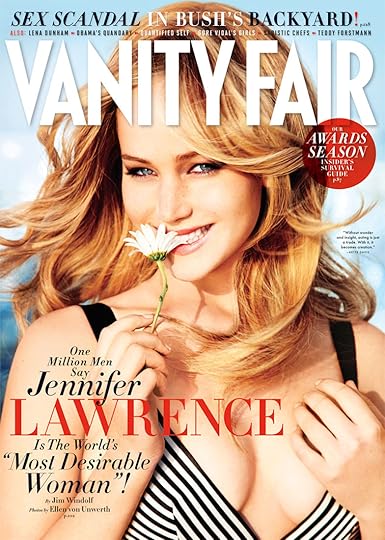 Imagine if Katy Perry’s church, Jennifer Lawrence’s church, Brad Pitt’s church had done more than let them sing and act on stage, but had commissioned them, trained them, talked about their gifts, their vocation, their calling? What if we treated artists as if they were training for diplomacy work in Hollywood rather than shady work beyond the church walls? What if our artists are the Daniel’s and Esther’s of today?
Imagine if Katy Perry’s church, Jennifer Lawrence’s church, Brad Pitt’s church had done more than let them sing and act on stage, but had commissioned them, trained them, talked about their gifts, their vocation, their calling? What if we treated artists as if they were training for diplomacy work in Hollywood rather than shady work beyond the church walls? What if our artists are the Daniel’s and Esther’s of today?
Our poets, our singers, our actors are all missionaries as much as those who go to Togo and translate the Scriptures into a new tongue. American artists translate their good news for this generation. And if the church cannot offer any good news to the artists in their congregations, no wonder Jesus is absent at the Grammy’s.
“The kingdom of heaven is like a mustard seed.”
To notice the small things, to write on them, to appreciate them, to see well, is the work of a poet.
Have you noticed how invisible our artists are in our churches? Unless they’re illustrating the sermon, where are they?
Pay attention for a moment to that problem.
As my poet friend, A. explained
Churches don’t value art or poetry as much as we value teaching, preaching or leadership. When it comes to the arts in general, they can be such a powerful means of expressing your soul, of being aware of creation and delighting in its Creator, of addressing the problems locally and worldwide. Poetry can give you the freedom and integrity to express exactly who God has formed you to be.
Of all groups in the world, the capital “C” church needs to get on this. If we can integrate the free-thinking, the free-expressing-nature of the arts into the church, don’t you think that would combat a lot of the shame, the abuse, the congregational and individual issues that go on?
All of a sudden Jesus’ bride would look alive and radiant instead of hollow and bland and shame-ridden. And maybe the Church would have a voice of freedom instead of a voice of oppression.
I believe in poets like A. that her calling matches the calling of my missionary friends in Togo.
This summer, July 24-28, my husband and I will host Soulation’s GREEN Gathering, “Fully Free and Fully Alive after Spiritual Abuse.” Poetry will flank our time together, choice food will bless each day, beautiful vistas will greet us each morning. Maybe you’re hungering for it as much as I am. (Want to come? three spots left).
And in the meantime, consider the poets in our midst. Bless them, for they are, as David the Psalmist, men and women after God’s heart.
March 13, 2013
Taking Sexual Hunger Seriously
Why is it so hard to be celibate or a virgin today? Why does virginal or “born-again virgin” status (as commentor, Meghan, pointed out, not all celibate people are virgins) make headlines (Lolo Jones or Sean Lowe). Why is virginity something some stations hide (ABC)?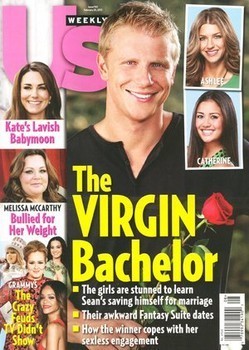
Is it just the tall-poppy syndrome where anyone with self-control in the sexual department gets cut down to size to make us all look better? Is celibacy as rare as we are told?
What do Virgins Know about Sex?
I’ve been studying sailing the last few months. I read books about the different vocabulary for the sails, knots and windpower. But I have never sailed.
In the same way, virgins can know a lot about sex, either through paying attention to their own body and soul, through reading, through listening to their friends experiences, to simply praying about sexuality.
It’s unfair to say that a virgin cares nothing for and knows nothing about sex. Just as it would be unfair to say I know nothing about sailing.
Sailing or making love will most definitely add experiential knowledge, but the experience is not the final word on knowledge. If it were, sex books wouldn’t ever be written. In fact, some sexually active adults know less about sex than some self-aware virgins.
My favorite example is Karol Wojtyla, later known as Pope John Paul II. A celibate man who wrote extensively about the bodies of men and women, sexual intimacy (everything from the value of climaxing at the same time to enjoying a person internally during sex), and sexual self-realization (read more).
But my celibate friend, Brandon Hoops, also knows about sex. He knows sexual desire, he knows his sexual organs, what it feels like to face the hunger of not enjoying sexual intimacy, he knows when he’s pushing his own boundaries for purity.
The Road Less Traveled
Choosing to be celibate is rare, especially as you get older. Hoops comments follow in italics.

Lolo Jones
I think what gets harder as you get older is that you become the butt of jokes. Think 40-year-old virgin jokes. Think of Lolo Jones from this past Olympics who said she was a virgin and people thought she was ridiculous. I don’t like talking about my celibacy not because I’m a prude, but because I don’t want to be misunderstood. “Virgin” has so much baggage.
Celibacy is one way I honor God, it’s not evidence that I’m a sexual joke.
Second the church makes it very hard to be a virgin when they tell me it will be so hard to wait so just get married ASAP. I don’t hear another voice saying you can’t live without sex so go hurry up and get married.
So, rule number one, don’t assume your friends that are virgins are prudes about sex. Don’t rob them of being part of your sexual conversations. It’s a skill to be able to talk about sex without it being weird. It’s a humility to realize how much virgins know about intimacy. Include celibate people in your conversations about sex.
Sexual Stewardship
Is celibacy all about avoiding sex? As commentor Mandy K asked in Part 1, “I do believe that celibacy can be a beautiful discipline, but have absolutely no idea what its practice looks like apart from abstinence.”
So how does a celibate person steward their own sexuality? Is it all about stifling your hunger, or is there another way?
From comments and testimonies all around the world, I’m convinced that the “just wait” campaign is not taking sexual hunger seriously. The drive toward ‘doing’ it is massive, and it feels very good, healthy, right, fitting.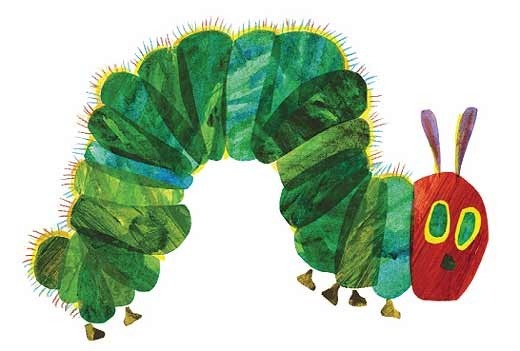
So the church ends up pulling out sharp tools: shame, frigidity, fear, disgust. Here’s a tip, church leaders, you’re not doing young ladies a service by demonizing the male organ. And then, I’ve heard too many stories of women who foreplayed it up and then learned to shut off (to stay virgins) so now, they cannot enjoy their husband’s bodies (one example). Sexual hunger is serious, it’s not something to dismiss or squelch.
A married person and a celibate person steward their sexuality from much the same starting point. We must be honest about what we desire, who we fantasize about, how this is helping or hurting our capacity to be more fully human. Sexual stewardship often will involve self-discovery, even self-stimulation, exploring and sometimes climaxing on your own (aka masturbation). I make this claims because I, contrary to many vocal Christians, believe it is possible to masturbate without lust (disagree and want more? Check out behavioral scientist, licensed family therapist, medical family therapist, and certified sex therapist, Tina Schermer Sellars’ post). If, as a single man or woman, masturbation disgusts you, then consider that you may have some fears about loving your body and enjoy pleasure.
We could even speculate that Jesus who was neither afraid nor disgusted by sensual pleasure (Mary anointing his feet) or physical celebration (turning water into wine) encountered his own wet dreams and understood how his body worked sexually (Heb 4:15). At the very least, the doctrine of full humanity that Christianity teaches (our bodies, not just our souls, are saved in the resurrection of the dead) means that our bodies are good aspects of who we are. Every aspect of our bodies, from the way we slurp a cold smoothie to the way our skin tingles when touched by one we love is good. Our sexual organs will be part of the resurrection. God doesn’t plan to erase them.
As we steward our sexuality, the root of why we are afraid or addicted or disgusted is worth bringing to God. For years, I lusted (imagined having sex with) men afraid to know WHY God called that sin. It wasn’t until I opened up my imagination to the possibility that lust really did hurt me, that God called faithfulness and chastity good, that I found a cure. And in the process, as I’ve grown, God didn’t ask me to turn off my capacity to admire and appreciate men.
I didn’t stuff away or erase my sensual appreciation, I merely re-ordered it so I was mastering it and not it mastering me (more on that in this presentation of Dale performing The Red Lizard from C.S. Lewis’ The Great Divorce. Go to minute 18:06).
[image error]So for me, a married woman of 11 years, sexual stewardship means I communicate what I want sexually with my husband. It means, I admit when I feel desire/attraction for other men, first to myself, then to God, then to Dale. Distinguishing between sensual attraction, sexual attraction and romantic attraction is very key in these moments. An example from my friendship with Hoops will help. I’ve often noticed how men have distinguishing parts of their bodies that are lovely. I am sensually or (if that term bothers you), aesthetically attracted to them. Wanting to make love to them is not part of it. But something smiles in me when I see or hear it. Bono’s voice, Nick’s feet, and (wait for it) Hoops’ legs. Don’t worry, I’ve already told Hoops. In fact, it’s his ankle bones in particular. They’re just lovely. I’ve even pointed them out to my husband. But I now know, I’m appreciating Hoops, not lusting after him.
I’ve experienced the same thing. When I was in Honduras I shared with a woman there, “You have very expressive eyes.” By the way she responded, I could tell it impacted her. Most people are unhappy with how they look.
So part of sexual stewardship is noticing our bodies and re-building our self-concept of our bodies in community, with good cross-sex friends.
For me, as a single, celibate man, it’s easy to think sexual stewardship means to stop masturbating and turn lust off. But, it actually means being more engaged in the dialog with others about desire. Trying to write this post with you on “Sex and Singleness”, preaching about sex last spring, reading Sex for Christians by Smedes all helped me. It was good to find safe people to share what I was wanting sexually, to let myself openly talk about it.
So are you saying you’re finding more roads to understanding your sexuality than the glitzy orgasmic one?
Yes. And I suppose I’m learning sexual sins are not roadblocks to God’s power. When I was in Zurich in November, the Grossmunster church had these huge doors, covered in artwork. In particular, on the bottom of the main two there are four cubes, each with the picture and name of women from the Bible. Bathsheba and Rahab, from Matthew’s account of the lineage of Jesus, are included. We don’t think of them as sexual screw-ups or castoffs but today they would be. It struck me how the Bible doesn’t hide the Rahabs and Bathshebas, but the church wants to hide the sexual screw-ups.
It’s time to change the way we use the church doors.

Grossmunster Church, Zurich. Find Rahab and Bathsheba along the bottom row
March 6, 2013
Why 30-Year-Old Virgins are Not Sexless
Celibacy is the commitment to remain sexually chaste while not married.
If the movie, The 40-Year-Old Virgin, is any indicator, celibacy gets a bad rap as if only prudes and social outcasts are virgins by age 40. Even in most churches, celibacy is treated like a second-tier gift of God. Virginity, it seems, is only cool until your mid-twenties, then it’s time to get that thing fixed. Preferably with marriage. Even on Sunday mornings many of us marrieds try to fix up our unmarried friends, as if their singleness bothers us.
The reason being that our church friends all live within a culture that celebrates what it calls “sexual freedom” as the ultimate lifetime achievement. (e.g. the February issue of “Esquire” essay “The Martyrs of Sex” by John H. Richardson). So when my thirty-year old virgin friend says he feels sexually frustrated he gets oddly coherent messages from both the world and the church.
“Wait,” says the church with an eye to snag the next available bachelorette.
“Go for it,” says the world.
Both the church and the world suggest that sex is ultimate for human flourishing.
Jesus never taught that.
My friend and co-writer at Soulation, Brandon Hoops and I have decided to put our heads together to discuss sex and singleness. Hoops has attended and served with churches for his entire life, he knows whereof he speaks when he talks about ‘church culture.’ I’ve put all of Hoops words in italics so you can easily follow our conversation.
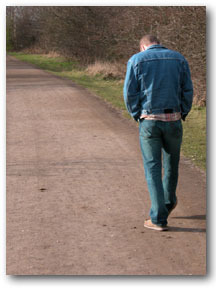 Being single and dealing with sexual desire is a complicated and lonely journey. In the church, most sexual desire conversations begin and end with lust. I’ve gotten into a new small groups before, and I can tell from the leader that there will be intense pressure to talk about lust. Lust can become magnified as if it’s the only real issue. I remember one group would end by tentatively going at the lust/masterbation topic. Every time. It got wearisome.
Being single and dealing with sexual desire is a complicated and lonely journey. In the church, most sexual desire conversations begin and end with lust. I’ve gotten into a new small groups before, and I can tell from the leader that there will be intense pressure to talk about lust. Lust can become magnified as if it’s the only real issue. I remember one group would end by tentatively going at the lust/masterbation topic. Every time. It got wearisome.
I have a childhood memory of going to a church conference and doing one of those “head bowed and eyes closed” things where I tentatively raised my hand and committed my dirty, sex-crazed teenage mind to God. More guilt. These experiences shaped what I’ve come to call ‘sin management.” That management is what God is most interested in, that we manage our sin, in much the same way that the Pharisees worked hard to help the Israelites manage every area of their lives.
I’ve learned God wants more than good performance, he wants our whole selves.
But the virginity-narrative of Christian culture is that God is much more interested in sober, virginal teens (I am thankful to Lars Rood for this pithy description) than whole, human selves. The message ends up being: God wants us to wait, not God wants us to become more fully human. Can you recall all those reasons we were told to wait?
Most of those reasons were punishment driven. Wait to have sex because if you don’t you’ll suffer the consequences: STDs, pregnancy, lack of intimacy later, hell, fear of infidelity later, shame, displeasing God. Or the simple one: you’ll just feel bad. But is the threat of consequences really the best motivating factor.
So then someone has sex and doesn’t feel bad or doesn’t get pregnant or get an STD or has a raucous time and a wonderful marriage and where does that leave these peeps? confused, angry. If anything they’ll feel lied to.
Fear works, but it’s a bit off from the motivation in 1 John, “Perfect love casts out fear.” So what kind of love motivation can you give people who want to keep their sex life and their marriage life in sync?
You can start with simple value for your private parts and where they go, what they do as a way to maintain personal health. I’ve been helped by thinking about the verse, “You were bought at a price therefore honor God with your body” (1 Cor 6:20). I think of a child of a single mother who works three jobs and wears herself out so that she can send her kid to college. That kid knowing his mom’s sacrifice and effort, hopefully, will go off to college eager to put forth an effort to honor her. He won’t treat her gift lightly. I think the same applies to our sexuality.
 As I’ve written about before, sanctity, celibacy, holiness all require setting something apart. In celibacy you set apart your sexual appetite. Celibacy means you face your hunger for sex as if you trusted that God called this hunger good. It’s not just the satiation that’s good, but the actual hunger. In many ways the hunger must be faced, not simply squashed. In fact, just as a fasting person knows the power of food, so a virgin knows the power of sex. There’s a reason Madonna wrote that song “Like a Virgin”. Virgins are hardly sexless humans. Maybe the current “born-again-Virgin
As I’ve written about before, sanctity, celibacy, holiness all require setting something apart. In celibacy you set apart your sexual appetite. Celibacy means you face your hunger for sex as if you trusted that God called this hunger good. It’s not just the satiation that’s good, but the actual hunger. In many ways the hunger must be faced, not simply squashed. In fact, just as a fasting person knows the power of food, so a virgin knows the power of sex. There’s a reason Madonna wrote that song “Like a Virgin”. Virgins are hardly sexless humans. Maybe the current “born-again-Virgin
Bachelor” is enough proof.
I like the metaphor for language learning, too. With my sex life, my husband and I have developed 11 years of sexual vocabulary. Celibates are choosing to wait to take Sex 101 with the person they’ve committed to for life. This makes them unversed in orgasmic descriptions or new techniques, but they’re quite aware of the power, the delicious attraction and growing hunger of sexual desire.
In Part 2, Hoops and I will talk about why it’s hard to be a virgin today, how to combine waiting and sexual desire and what sexual stewardship means for a married and a single person.
February 27, 2013
When Do You Start Sex Ed?
This week I’m staying with my Mexican grandmother and Spanish-French grandfather in their home in Whittier. My husband is taking the week to write in Laguna Beach. I’m taking this week to immerse in Spanish and remember what it is like to be loved like a child, again.
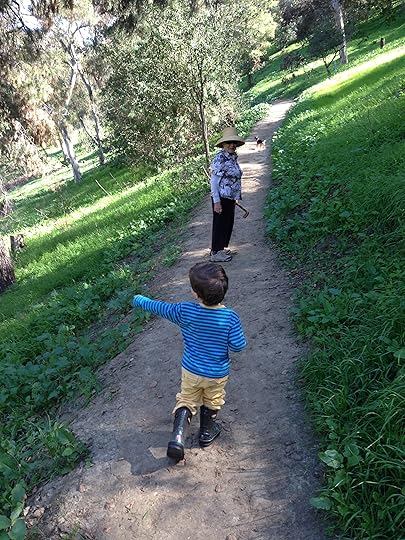
My grandmother leads my son. Whittier Hills, California.
My grandmother took me on a walk through the Whittier Hills. We walked along tiered green hills that reminded me of the perennial greens of my childhood. This is a land that most who visit Los Angeles do not ever see. Tucked into the foothills of Whittier I feel at home.
Tonight my son jumped on the bed in front of a mirror before my grandmother came to hear the bedtime story. He wasn’t wearing a stitch of clothing. When she arrived he let her tickle his feet before jumping into another routine. My grandmother’s stout, four foot nine inch frame lay across the bed as I read The Precious Pearl. I sat cross-legged, my son on my lap and my grandmother’s tummy close enough to brush my toes. I knew she felt neither uncomfortable nor apologetic.
I know my grandmother’s secret, touching is part of the way she speaks. With broken English, her touch is part of her swift wit. Her body’s timing outpaces her tongue’s English.
Living with her and my grandfather, I am kissed and hugged, patted and elbowed more than I am at home in Colorado, with a loving husband and two-year old. I feel cared for in ways I haven’t been since I was a child.
This tactile, hands-on communication makes me more eager to reach for my grandfather’s stooped shoulders as he limps to his bedroom to retire to give him a hug and un beso (a kiss). I never see annoyance in his eyes when my son asks to snuggle next to him, even though the night is warm and his grubby fingers are sticky.
Holding my grandmother’s hand reminds me of the legacy I have to pass to my son. My grandmother is one of the few who refuses to quarantine the vocabulary of touch to the erotic. She doesn’t apologize when she touches me, even when the touch comes as a swift slap on my arm to drive a joke home or a pantomimed spank on my son’s bottom to mock his naked antics.
In watching her this week, I’ve thought of the elasticity of a woman’s body.
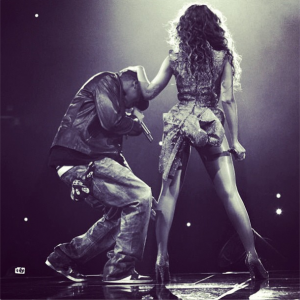
Beyonce
A woman’s body plays dual and triple roles. A woman’s hands may wash a baby’s hair in the morning and caress her husband’s body at night. A woman’s body can hold a man’s member and channel a newborn baby into the world. Eyes used for sexual desire can also telegraph warmth and familial love. Breasts play both food and sex roles, sometimes within an hour in a night.
Last month, my son discovered the pink watermelon shape below a cow’s stomach. When I told him it was an udder, he asked, “What’s udder?”
“It’s where the cow keeps her milk.” I said.
“Ohhhh,” my son said. “Udder’s for milk?”
I hesitated for a moment, wanting to draw the connection but not certain. I have had a reluctance to connect my milk-making capacity to a cow for several years. The main reason being I don’t like to think of my breasts as anything like an udder. I even re-designed the sign for “milk” because I didn’t want my son pantomiming milking a cow when he wanted a drink from me.
Parents, have you ever felt uncertain and a little shame creep in when you see your child ready for some piece of the sex education puzzle as you feel reluctant to dive in? I didn’t want to discuss something private about my body with my son, even if it would help him learn about biology and reproduction.
I started pushing into that reluctance:
Was this desire for privacy healthy? Did it stem from the right kind of boundary-creation as my son learned independence?
Or was I being squeamish about the idea of connecting my body with milk because it felt undignified?
Was it the cow’s milk/mom’s milk connection that was bothering me? Yes, I think about these things over making breakfast.
I wanted to push the conversation into the realm of “He can wait until he’s older to learn about breasts and milk.” But that realization stopped me.
How would this conversation with a three or four year old be any easier? My son is not aware of embarrassment or shame, yet, not where bodies are concerned.
My son was still trying out the word, “Udder” when I opened my mouth again,
“I used to have milk, too,” I say from the kitchen, stirring the cream of wheat. “Right here,” I turned toward him and pointed. I gave him the correct word and explained how mommies’ breasts have milk for their babies.
Fascination, curiosity rippled across his face for about three seconds. But the cow’s udder reclaimed his interest.
“Udder makes milk!” he told me again when I brought his bowl over to the table.
It’s just the beginning, but I felt like I planted a flag that morning. I didn’t play the shame game with my son or myself.
Have you also found that the time for reproductive teaching, like all of the best lessons, happens in the moment when your child has a pressing question? Those golden moments.
I want to build on my son’s knowledge block by block rather than hit him with a sex talk in a heaping, let’s-get-it-all-out-there presentation.
I suppose this means I’ll have to chink away at my own shame in the process. It means I must be attentive to my son’s questions and push into why I do and don’t want to answer them.
Parents, any ideas along the way? I’m all ears.
February 20, 2013
Fully Disabled: Fully Human
Krysta and Jeremy had just walked into Winona’s restaurant, their six and four-year-old in tow. As they draped their coats over chairs and got settled I made my way over to say hello. Krysta is a mother of three (11, 6, 4) with another on the way. She brings 31 years of passion and introversion entwined into all she does. I love her for both. Besides running our catering for Soulation’s Gatherings and writing a Bon Appétit-lauded foodie blog, Krysta is also the mother of Olivia.
Olivia has Angelman Syndrome (AS), a limitation that has two variations, either a deletion or a limitation of the 15th chromosome. Olivia has the limitation kind at four, Olivia cannot walk or talk, though she makes up for her inability to communicate verbally with shrieks of delight, smiling and food catapulting.
At Winona’s, I crouched down to say hello. At eye-level Olivia grinned and swung a mouthful of watermelon straight into my eye. Mascara and pink juice started dripping down my face. Olivia was thrilled.
“She got you,” Jeremy said, grinning.
Jeremy and Krysta have been married eight years. I wanted to ask them how their life with Olivia has changed them and they kindly agreed to an interview.
Jeremy, a 36 year old entrepreneur, physical-training-junky, nutritarian bolts into any new challenge. In high school, he had a standing bowling/McDonald’s date with his dad and a severely handicapped friend. Jeremy shares, “For a number of years right out of high school I prayed off and on, ‘God, if you ever want me or give me a handicapped kid, I’d be fine with that.’”
“He should have disclosed that to me when we got married,” Krysta said laughing. She went on to explain that she didn’t quite glide into the news.
“When I found out our baby might have AS, I felt like I was in shock. She was three months old and Jeremy shared this horrible creepy drawing from wikipedia. The nickname for kids with AS s is “Happy Puppet” because they look like a marionette, laughing and flapping their hands a lot. But, looking at that picture I felt like I was in a horror film. Olivia was only three months old and I didn’t realize she had all these symptoms. I was in denial, “No, no, no, no, no!” But when I started to read, I felt scared, because I knew Olivia fit this mold very well.”

Wikipedia’s picture next to Angelman Syndrome entry
I happened to see Jeremy and Krysta at Winona’s the night they learned the diagnosis. They didn’t look stressed.
“I wouldn’t use the word ‘stressed,’” Krysta said, “In some ways it was a relief to know. I think I settled into it. I’d say to myself, ‘I don’t know how to do this, but I’m doing it right now.’
But Olivia has changed both of them.
Jeremy said, “Olivia’s changed my filter and expectations. If you thought life was about having kids, raising them so they could move out and then you and your wife have time together, well . . .” Jeremy’s voice trails off. “There is a hundred percent chance that Olivia will need care for her entire life which will probably be into her 80′s. This significantly changes my expectations for life. Simple things get re-filtered like, ministry expectations, travel. AS doesn’t afford you selfishness. I still make an effort for self time, but Olivia redefines the purpose of my life. She’s made me re-think the purpose of everyone’s life. Western philosophy and evangelical theology say Olivia can’t fulfill the purpose of life. But I disagree.”
Jeremy once mentioned that he likes putting people into the position of interacting with Olivia, especially those people who are visibly uncomfortable around her. I wanted to know more about that.
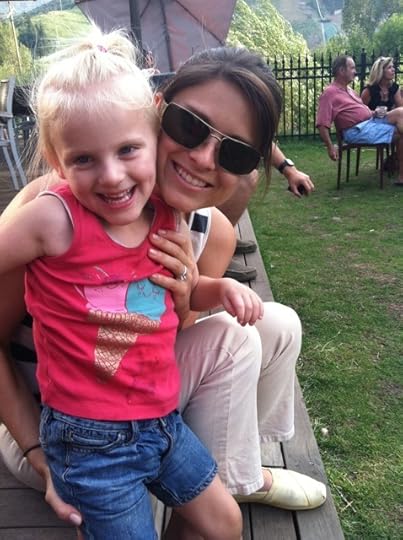
Krysta and Olivia
“I think Olivia is an easy challenge for people to be either blessed or challenged by her. I’ve never had an issue forcing people into that situation. I want to root for the goodness in them to come out. Olivia has the potential to bring out the best in every person she comes in contact with. She provides opportunity for greater humanity. I would hate to shortchange people by keeping Olivia away from them.”
My favorite part of the interview came when Jeremy and Krysta shared how Olivia makes them more human.
Jeremy said, “I thought fundamentally and from a purpose standpoint that all humanity would have the same value and had to have the same expected purpose. But that’s false. The only thing wrong with Olivia is a little twist in one of her chromosomes. That’s only one part of her humanity. So, what’s the difference between her and some guy being a quadriplegic or some girl that has bonked her head and isn’t totally mentally handicapped, but not firing on the same cylinders than I am? There is a whole relativity of humanity that I started to observe. Still haven’t gotten through that, I still can’t figure out how everybody fits together. I can’t imagine what it would mean for Olivia to be “normal” or “typical”. From a healing perspective I have no idea where to go, I have never prayed for Olivia to be healed from AS. Why would I pray for that? It would say AS is against God’s will for her. And it makes me go back to the “normal” life paradigm. I have a lot more mercy and grace when it comes to people and the struggles they have. Everyone seems to be wired differently.”
Krysta explained that this question on being more fully human struck her. “When something like AS is placed in your lap, all of a sudden you have to practice self-sacrifice, contemplation for how God works, vulnerability, uncomfortableness talking about this with other people, patience. You have a choice, if you lean into these things it can excel your growth. I feel like it means a lot of ‘being worn’. There’s a song by Tenth Avenue North called ‘Worn” that I can so identify with (Listen to “Worn“).
Krysta continues, “Ann Voskamp has a quote I love to use about this. “It’s the heat that refines.” I can put my head down and grit my teeth and do this begrudgingly or I can lean into the uncomfortableness without a blueprint and let Olivia teach me so I can be worn for her. At the end of the day I’m seeing that creates much more beauty, much more vulnerability which makes me more human. I feel more human because of Olivia.

The MacGray Family, Christmas 2012
Photo credit: Kel Elwood
To find a good blog on parenting a child with disabilities at Amy Julia Becker’s blog “Thin Places: Faith, Family and Disability” or her book A Good and Perfect Gift</em>. For more Soulation resources about God and physical disabilities see MyFaithHurdle this month: Why Does God Allow Mental Disorders to Exist? Next month, look for my post at RubySlippers on living with adults who have disabilities, what it means to befriend someone with a food allergy and how those we avoid can teach us more about being human.
February 12, 2013
Why I Don’t Give out Sex like Gold Star Stickers
February 6, 2013
East L.A.: Diversity and Me
After three days of intense writing on firearms and gun control/freedom, I want to take a breather and as February blooms, talk about love and sex. This week I’ll be writing about how love for those outside our ethnic groups makes us more human. Next week a critic on why giving out sex like gold star stickers to men doesn’t help friendship. The third week, I’ll write about how those with severe allergies and disabilities teach us about God’s love and the last week I’ll write about loving our children enough to talk about sex.
Last year, I read Tattoos on the Heart by Gregory Boyle founder of Homeboy Industries. I loved this book. Boyle’s work with ex-cons in inner-city Los Angeles is now highlighted as incredible and successful. Boyle is invited to speak to colleges, blowing his interviewers out of the water. But Boyle started his “ministry” without attracting compliments or understanding. In fact, Boyle’s idea that all ministry must be two-sided for any lasting change to take place (no more “drive-by acts of charity”, as he would put it) reminds me of the woman who first shared Boyle with me.
Her name is Alicia Miller.
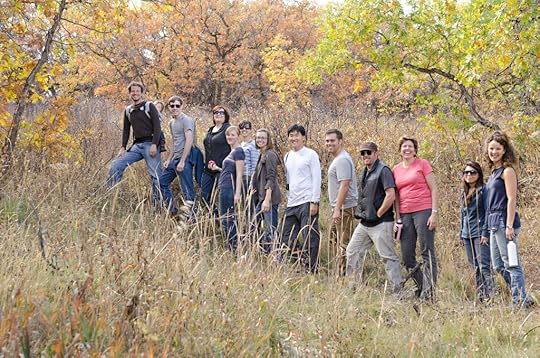
Two of our first donors to Soulation attended GOLD Gathering 2012. Alicia was one of them. She’s standing near center wearing a coffee-colored jacket.
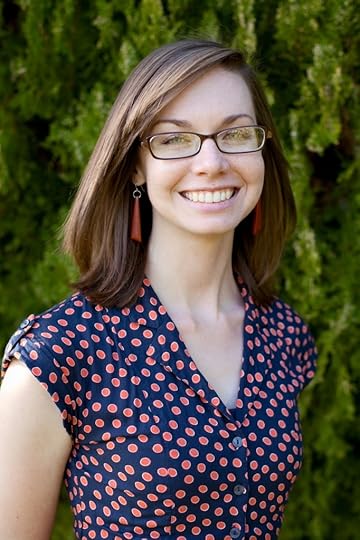
Alicia Miller
When longtime supporter of Soulation, Alicia Miller (remember her from “Beauty and Headscarves“?), attended our last GOLD Gathering, 2012, I invited her to challenge us with another way of being a missionary (More about America’s missionaries to America). Alicia’s work intrigues me because she didn’t go looking for it. Perhaps that’s what I love the most: Alicia has found her Calcutta in America (Mother Teresa quote). Here is her story in her words.
“Find someone who is different from you in ethnicity, gender, or age — preferably more than one — and pair up. In seven minutes share your story and about your identity.”
The voice faded as fear grips me. I gulp, starting to sweat. Talk about my identity for seven minutes? I frantically scan the room for someone different than me — but not too different.
I lock eyes with an Asian girl who I guess to be a freshman and bee-line for her. We find chairs and face each other, my stomach flipping somersaults.
As a white woman, becoming involved in Multi-Ethnic Programs (MEP) at Biola University was one of the most stretching and transforming journeys on which I’ve ever embarked. It was there that I became convinced that I needed diversity in my community to become more fully human.
Downward Mobility
Raised in an upper-middle class home in a predominantly white suburb, cultural events were a fun hobby — eat delicious food, listen to different music, take a trip to little India. These experiences were supplemental — not integral. My worldview was small. Going out with friends to eat “ethnic food” is mild compared with the vulnerability needed to eat a meal in the home of my first generation Chinese neighbors — as I’ve since discovered.
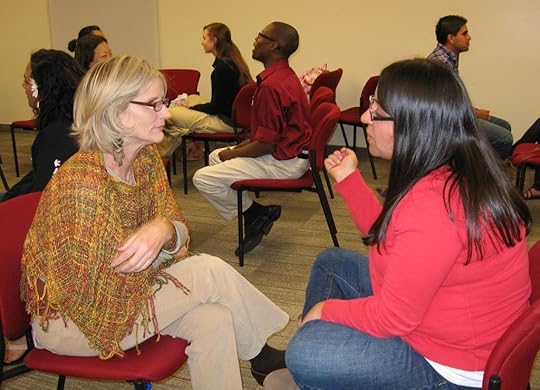
Alicia’s first MEP Event. See her in the back left corner?
A year and a half from my first MEP event I found myself sitting on a porch with blue steps in East Los Angeles watching neighbor kids play in the sprinkler on a sweltering summer day. I eyed their shoes lined up in the sun as I listened to their squeals.
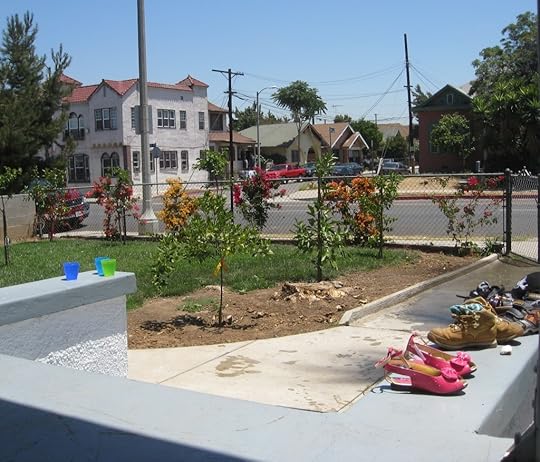
East Los Angeles – the kids shoes and cups lie unattended while they play in the sprinkler
After graduating I did the exact opposite of what I anticipated: I did not move overseas as a medical missionary — instead I moved to a predominantly Latino neighborhood in Los Angeles. The Spirit beckoned me to my own backyard, my own Samaria, when I would have preferred to go around Samaria to reach the ends of the earth (Acts 1:8).
I neither paid down my debt (like a responsible adult) or got an apartment on my own. Instead I moved to an intentional community house that held seven other women and men. I applied to over 200 nursing jobs while I found myself cohabitating with cockroaches and living a bare bones lifestyle. In my new home, I discovered clutter in my soul, stuff that kept me from seeing my neighbors as fully human.
To de-clutter the mess I had to learn that I have a culture, an ethnicity. I quickly discovered that I believed the white, middle-class way of doing life was the best way. I thought I was “giving” by being the well-intending student with a savior complex. I realized I was “receiving” by only partaking in other cultures in order to add “flavor” to my life.
It’s been two and a half years since I moved to East LA. After a year in the community house I relocated one neighborhood north to be within walking distance of my church community. I live across the street from an elementary school and a massage parlor. I awake to the smell of my neighbors burning incense and to the sounds of instruments from the Buddhist temple next door.
Eventually I became more comfortable with being uncomfortable; secure in acknowledging what I did and didn’t know about myself and others while striving to learn and grow as much as possible. Though initially inconvenient and awkward, this new community breathed fresh wind into areas of my worldview I didn’t know were suffocating.
Communion
“Necesito refrescar este seco corazón, sediento de ti! Sumergeme… sumergeme…”
The music swelled and I rock back and forth praying, as church attendees line up to receive communion. Eventually I join them, streaming up the aisle toward my mentor holding the bread, the teaching pastor holding the cup. I intentionally look my mentor and pastor in the eye, reminded that I need community.
Regardless of how different we are from one another we bring all of our humanness (our clothing styles and languages, our values and experiences) to the feet of Jesus to be reconciled — to him and to each other. Jesus came to make us fully human, not colorblind and cultureless.
As I worship and read the Bible in new ways, I see a fuller picture of who God is. God may be a God of order but he’s not necessarily as time-oriented as I am — I would imagine he delights in church services that go “overtime” (as ours often do).
I’ve danced the Cupid Shuffle until my legs felt like jello and my heart burst with joy.
I’ve woken at 2am to drive youth safely home from a party.
I’ve helped high school seniors write essays and apply to college.
I’ve witnessed physical healings and financial miracles.
I’ve counseled teen girls through abortions, miscarriages, and births.
I’ve watched silent junior highers find their voice and angry high schoolers exude peace.
I’ve seen broken families restored, and I’ve restored relationships with my family.
Alicia on a church retreat with her youth group.
I never found the financial security and esteem of a nursing job. Instead I devote myself to the department that started me on this journey. What I once perceived as loss I now view as gain: I’ve been given a worldview that has transformed my life. My community’s joy and pain is my joy and pain. Our futures are bound up in each other’s; we rise and fall together. I’ve given much, but I’ve received more.
My community makes me fully human.
Want to learn more? Ask Alicia, who will be joining us in the comments, your questions.
Read more from these three resources Alicia highly recommends:
Being White: Finding Our Place in a Multi-Ethnic World by Doug Schaupp and Paula Harris
The Upside-Down Kingdom by Donald B. Kraybill
The Danger of a Single Story TED Talk by Chimamanda Adichie (Jonalyn loved this talk!)
Alicia Miller recently discovered that she’s more creative than she thought. She loves Thai food, reading, and having conversations about ethnicity, gender and other aspects of being human. She is a student at Talbot Seminary and works in Multi-Ethnic Programs & Development at Biola University. Read more of her work at aliciammiller.com
Jonalyn Fincher's Blog
- Jonalyn Fincher's profile
- 9 followers



